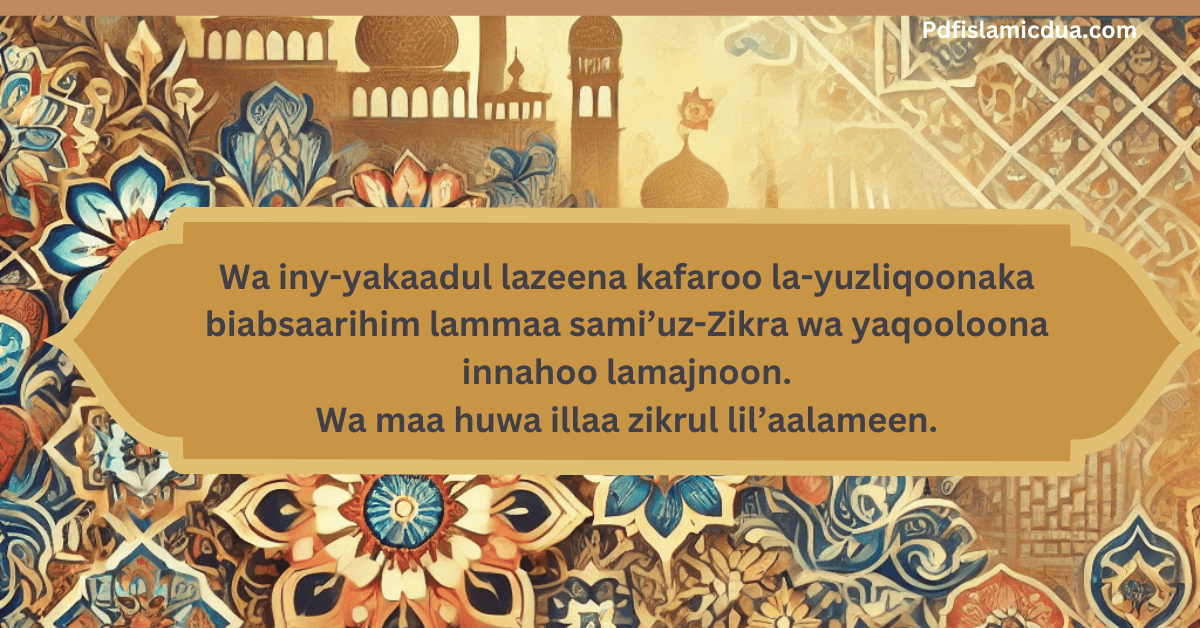Blog
Dua & Surah PDF
last 2 ayat of surah qalam, last 2 ayats of surah al qalam, last 2 verses of surah qalam, surah baqarah last 2 ayats, surah qalam, surah qalam ka wazifa, surah qalam ki akhri 2 ayat, surah qalam ki akhri ayat, surah qalam last 2 ayat, surah qalam last 2 ayat 100 times, surah qalam last 2 ayat 11 times, surah qalam last 2 ayat ka wazifa, surah qalam last 2 ayats, the last two verses of surah al-qalam | surah qalam last 2 ayats
pdfislamicdua
0 Comments
Surah Qalam Last 2 ayah Benefits, Translation in Arabic & English
The Surah Qalam Last 2 ayah is about the harm caused by the envious gaze of the disbelievers, which is known in Islam as the Evil eye. These verses show the challenges faced by Prophet Muhammad (peace be upon him) and teach the importance of patience, while also reminding us to seek protection from such harm. The surah emphasizes Allah’s justice and the importance of the Day of Judgment, reminding believers that everyone will be accountable for their actions.
Surah Qalam Last 2 ayah Translation in Arabic & English
| Arabic Text | Transliteration | English Translation |
|---|---|---|
| وَإِنْ يَكَادُ الَّذِينَ كَفَرُوا لَيُزْلِقُونَكَ بِأَبْصَارِهِمْ لَمَّا سَمِعُوا الذِّكْرَ وَيَقُولُونَ إِنَّهُ لَمَجْنُونٌ | Wa iny-yakaadul lazeena kafaroo la-yuzliqoonaka biabsaarihim lammaa sami’uz-Zikra wa yaqooloona innahoo lamajnoon. | And indeed, those who disbelieve would almost make you slip with their eyes [i.e., looks] when they hear the message, and they say, “Indeed, he is mad.” |
| وَمَا هُوَ إِلَّا ذِكْرٌ لِلْعَالَمِينَ | Wa maa huwa illaa zikrul lil’aalameen. | But it is nothing less than a Message to all the worlds. |
Related post
Benefits and Translation of Ayatul Kursi in English PDF
Bismillahi Arqeek min Kulli Dua Benefits, Meaning
Dua For Evil Eye Protection in Roman English
Revelation of Surah Qalam
Surah Al-Qalam was revealed in Makkah and directly addressed the objections of the disbelievers against the Prophet (PBUH) and the message of Islam. The Surah Qalam Last 2 ayah 51 and 52, specifically refer to the harm attempted by the disbelievers through their envious gaze, which Islam recognizes as the evil eye.
Hadith
The Prophet Muhammad (PBUH) said:
“The evil eye is real, and if anything were to overtake destiny, it would be the evil eye” (Sahih Muslim 2188).
This hadith affirms the concept of the evil eye in Islam, showing the importance of seeking Allah’s protection, just as mentioned in Surah Al-Qalam’s last two ayahs.
Ibn ‘Abbas reported Allah’s Messenger (ﷺ) as saying:
“The influence of an evil eye is a fact; if anything would precede the destiny it would be the influence of an evil eye, and when you are asked to take bath (as a cure) from the influence of an evil eye, you should take bath.” (Sahih Muslim 2188)
Simplified Explanation of the Two Ayahs
In verse 51, Allah acknowledges the harmful intentions of the disbelievers, who with their intense gaze and jealousy, tried to harm the Prophet (PBUH) and called him mad. Despite their hatred, Allah reassures that the Prophet (PBUH) is delivering nothing but a divine message for all the worlds, as mentioned in verse 52. These verses also serve as a reminder of the evil eye’s danger, yet Allah’s protection is always present.
Benefits of Reciting the Ayahs
• Protection from the Evil Eye: These ayahs offer spiritual protection against jealousy and the harmful effects of the evil eye. Reciting them reminds us of Allah’s shield over us, especially when facing the jealousy of others.
• Peace and Reassurance: In times of distress, regularly reciting these verses brings peace, reminding us that Allah is always in control, and no harm can touch us without His will.
• Affirmation of Faith: The ayahs help reinforce the believer’s faith in the truth of the Qur’an and in Allah’s justice. It comforts the heart, knowing that Allah is watching over us and will protect us from unseen harm.
• Spiritual Strength: Through these ayahs, one finds inner strength to face challenges, realizing that just as the Prophet (PBUH) faced trials with patience, we too can find courage through Allah’s protection.
Conclusion
Surah Al-Qalam’s final verses offer a powerful message of Allah’s protection from jealousy and the evil eye. They remind us to trust in Allah’s plan and seek His refuge in times of trial. Reciting these verses helps to shield ourselves from harm and strengthens our faith in Allah’s divine justice.














Post Comment